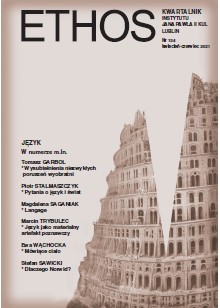LANGAGE. ZDOLNOŚĆ DO WŁADANIA JĘZYKIEM W ŚWIETLE BADAŃ LINGWISTYCZNYCH, FILOZOFICZNYCH I LITERACKICH
LANGAGE: LINGUISTIC COMPETENCE, AS SEEN IN THE LIGHT OF LINGUISTIC, PHILOSOPHICAL, AND LITERARY RESEARCH
Author(s): Magdalena SaganiakSubject(s): 19th Century Philosophy, Contemporary Philosophy, Philosophy of Language, Theory of Literature
Published by: Katolicki Uniwersytet Lubelski Jana Pawła II - Instytut Jana Pawła II, Wydział Filozofii
Keywords: Ferdinand de Saussure; langue—parole—langage; logos; energeia; poetic language; consciousness; linguistic relativism; anti-relativism;
Summary/Abstract: The author scrutinizes the terms: langage, langue, and parole, as used by Ferdinand de Saussure. Langage is interpreted as an exclusively human creative activity, which can be compared to the rationality described by Herder, and to the energeia described by Wilhelm von Humboldt. The description of the ability in question involves noetic and noematic analysis, originally proposed by Husserl as a tool to differentiate between internal and external experience and to ‘construct’ the external world. The author proceeds to demonstrate that the Husserlian analysis can be used also for the purpose of explaining the origin of language as such, as well as the origin of so-called poetic language. In the concluding part of the paper, the author considers the issue of how de Saussure’s theory of language relates to certain types of relativism.
Journal: Ethos. Kwartalnik Instytutu Jana Pawła II KUL
- Issue Year: 34/2021
- Issue No: 2
- Page Range: 123-145
- Page Count: 23
- Language: Polish
- Content File-PDF

